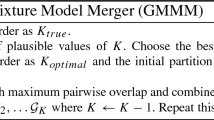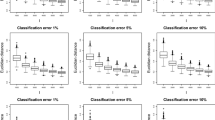Abstract
In this paper we introduce an iterative estimation procedure based on conditional modes suitable to fit linear models when errors are known to be unimodal and, moreover, the dependent data stem from different sources and, consequently, may be either non-grouped or grouped with different classification criteria. The procedure requires, at each step, the imputation of the exact values of the grouped data and runs by means of a process that is similar to the EM algorithm with normal errors. The expectation step has been substituted with a mode step that avoids awkward integration with general errors and, in addition, we have substituted the maximisation step with a natural one which only coincides with it when the error distribution is normal. Notwithstanding the former modifications, we have proved that, on the one hand, the iterative estimating algorithm converges to a point which is unique and non-dependent on the starting values and, on the other hand, our final estimate, being anM-estimator, may enjoy good stochastic asymptotic properties such as consistency, boundness inL 2, and limit normality.
Similar content being viewed by others
References
Chatterjee, S. and D.L. McLeish (1986). Fitting linear regression models to censored data by least squares and maximum likelihood methods.Communications in Statistics, Theory and Methods,15, 3227–3243.
Chung, K.L. (1974).A Course in Probability Theory. Academic Press.
Dempster, A.P., N.M. Laird and D.B. Rubin (1977). Maximum likelihood from incomplete data via the EM algorithm.Journal of the Royal Statistical Society, B 39, 1–22.
Healy, M.J.R. and M. Westmacott (1956). Missing values in experiments analized on automatic computers.Applied Statistics,5, 203–206.
Huber, P.J. (1981).Robust Statistics. John Wiley.
James, I.R. and P.J. Smith (1984). Consistency results for linear regression with censored data.Annals of Statistics,12, 590–600.
Laha, R.G. and V.K. Rohatgi (1979).Probability Theory. John Wiley.
Little, R.J.A. and D.B. Rubin (1987).Statistical Analysis with Missing Data. John Wiley.
Orchard, T. and M.A. Woodbury (1972). A missing information principle: Theory and applications.Proceedings of the Sixth Berkeley Symposium of Mathematical Statistics and Probability, 697–715, University of California Press, Berkeley.
Ritov, Y. (1990). Estimation in linear regression model with censored data.Annals of Statistics,18, 303–328.
Schmee, J. and G.J. Hahn (1979). A simple method for regression analysis with censored data.Technometrics,21, 417–432.
Tanner, M.A. (1993).Tools for Statistical Inference. Methods for the Exploration of Posterior Distributions and Likelihood Functions. Springer-Verlag.
Wu, C.F.J. (1983). On the convergence of the EM algorithm.Annals of Statistics,11, 95–103.
Author information
Authors and Affiliations
Corresponding author
Additional information
Research partially founded by Ministry of Education and Culture, Spain. Grant SEC99-0402
Rights and permissions
About this article
Cite this article
Anido, C., Valdés, T. & Rivero, C. Modal iterative estimation in linear models with unimodal errors and non-grouped and grouped data collected from different sources. Test 9, 393–416 (2000). https://doi.org/10.1007/BF02595742
Received:
Accepted:
Issue Date:
DOI: https://doi.org/10.1007/BF02595742
Key Words
- Asymptotic distributions
- consistency
- convergence rate
- grouped data
- imputation
- iterative estimation
- linear models




